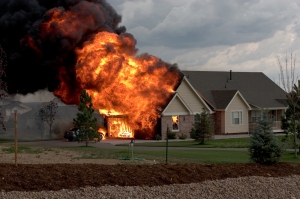 Wildfires continue to rage all over Arizona, and news agencies ABC15, CBS5 and AzFamily report progress as each is managed and eventually extinguished. When the wildfires are gone, so is the Earth’s natural protection. The loss of underbrush and rooted plants can cause many problems. You would think that the primary concern for homeowners in regions prone to wildfires would be to carry homeowners coverage to protect their buildings and personal property.
Wildfires continue to rage all over Arizona, and news agencies ABC15, CBS5 and AzFamily report progress as each is managed and eventually extinguished. When the wildfires are gone, so is the Earth’s natural protection. The loss of underbrush and rooted plants can cause many problems. You would think that the primary concern for homeowners in regions prone to wildfires would be to carry homeowners coverage to protect their buildings and personal property.
So why are residents being encouraged to purchase flood insurance in the midst of so many wildfires? Consider these facts:
- Wildfires destroy vegetation such as underbrush and trees.
- The loss of this vegetation through intense fire leaves only charred ground.
- Ground that is burned no longer has the ability to easily absorb water.
- The increased run-off of rainwater can cause mudflow or flooding.
- The areas at greatest risk are downstream or downhill from burned areas..
- The risks are more substantial during spring thaws, heavy rains, or winter storms.
What are the risks? Loss of property ranks highest with a flood. According to recent reports:
From 2002 to 2011, total flood insurance claims averaged more than $2.9 billion per year. In high-risk areas, there is at least a 1 in 4 chance of flooding during a 30-year mortgage. However, losses due to flooding are not covered under typical homeowners and business insurance policies.
How can homeowners protect themselves?
The unfortunate answer is that there are very few ways to reduce your risks of damage from floods or mudflows. The debris and silt that accompany these conditions also increase the level of damage. Until the vegetation returns to a healthy level in the areas affected by the wildfires (uphill or upstream from these burned areas), the ground is simply unable to absorb or reduce the flow of rainwater and snow melts. These simple steps can improve your conditions should you find yourself faced with potential flooding:
- Avoid loss of life or injuries, evacuate. Planning ahead for a safe location to move out of harm’s way ensures that there is no loss of life.
- Important papers and valuables should be kept in a waterproof safe, or in a waterproof place such as a safe deposit box.
- Take an inventory of your assets. Photos and descriptions will help you estimate your losses if you are affected by a flood.
The real solution? Flood insurance. When homeowners examine their current policies they find that they must purchase separate coverage for flood-related incidents. Ultimately, the best solution is protection through a flood insurance policy. As homeowners insurance specialists, we understand the needs of our region- this is our home, too. Our goal is to help you assess what coverages you need, whether you have the right coverage in place, and to fill any gaps that exist in your homeowners policies. We know that expenses after a flood can cause high out-of-pocket expenditures, and we want to help you reduce your risk of loss. Whether you live in a high flood zone or one that is less at risk (incidentally, more than 20% of claims come from low to moderate risk areas), there are solutions.

 Even though Hurricane Sandy wreaked havoc on the East Coast, thousands of miles away from Arizona, anyone with a home in the state might be thinking about flood insurance. Well, here’s some good news.
Even though Hurricane Sandy wreaked havoc on the East Coast, thousands of miles away from Arizona, anyone with a home in the state might be thinking about flood insurance. Well, here’s some good news.

